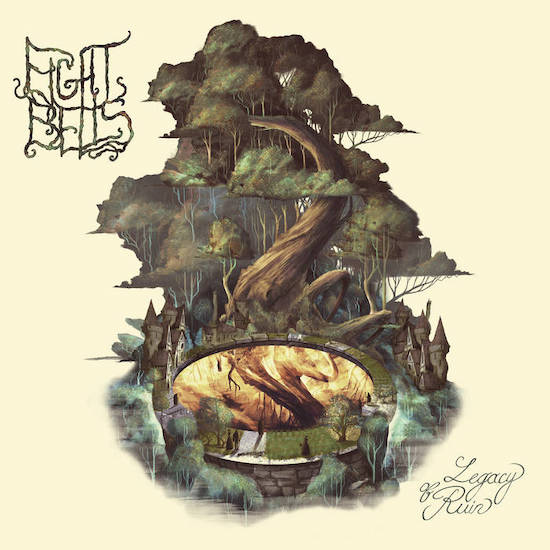Eight Bells singer, guitarist and driving force Melynda Jackson spent fifteen years or so toiling in the trenches with Subarachnoid Space – a chunk of that at a time when the world really didn’t give much of a fig for weird, sprawling, psychedelic metal.
While her third album with Eight Bells mightn’t be an easy pill to swallow – it’s challenging, and hardly projects endless, beaming happiness – you’d hope that people are perhaps a bit more receptive to the music she’s making thanks to a ubiquity of bands claiming to be ‘progressive’ or ‘experimental’. If they’re not then, well, that’s just a rotten shame, because Legacy Of Ruin is nothing short of majestic – a towering, deeply involved landscape unto itself that brims over with ideas and intrigue.
True, there might be a certain degree of familiarity to be found within the individual elements – doom, sludge, black metal, psych and prog all play their respective parts – but the album’s strength goes far beyond the ability to combine genres using seamless joins. Instead it speaks more to a certain unusual mindset – one that can draw on Death or Emperor while also sanely citing Brian Eno and Steve Reich as influences. Oakland lifers Neurosis are an obvious point of reference when it comes to a similar of spirit and vision, but perhaps more apt is the psychically (and occasionally physically) linked web of bands that has included Ludicra, Ails, Hammers Of Misfortune, Asunder and Amber Asylum – acts that might theoretically operate within one genre or another but are actually working out their own strange, individualistic blueprints.
Recorded against a backdrop of wildfires, power outages, political cruelty and social unrest, it’s unsurprising that Legacy Of Ruin might feel apocalyptic and drained of hope. There’s anger here and much sadness, and this is reflected whether the trio are fashioning huge, storm-battered crags of riff, going off full tilt with tremolo-picked ice blasts or gazing quietly inwards with twining, near-choral vocal harmonies.
If the themes of societal and environmental collapse mean things are as heavy thematically as they are sonically, though, it’s not all doom and gloom. For all the white-hot rage and exasperated disbelief, pale shoots of hope can also be found fighting their way up towards the distant sunlight. Admittedly it’s not much to cling to given the current state of things – akin almost to the glinting, knifeblade-thin sense of succour Cormac McCarthy slips between your ribs you at the end of The Road – but it is, at least, something.


